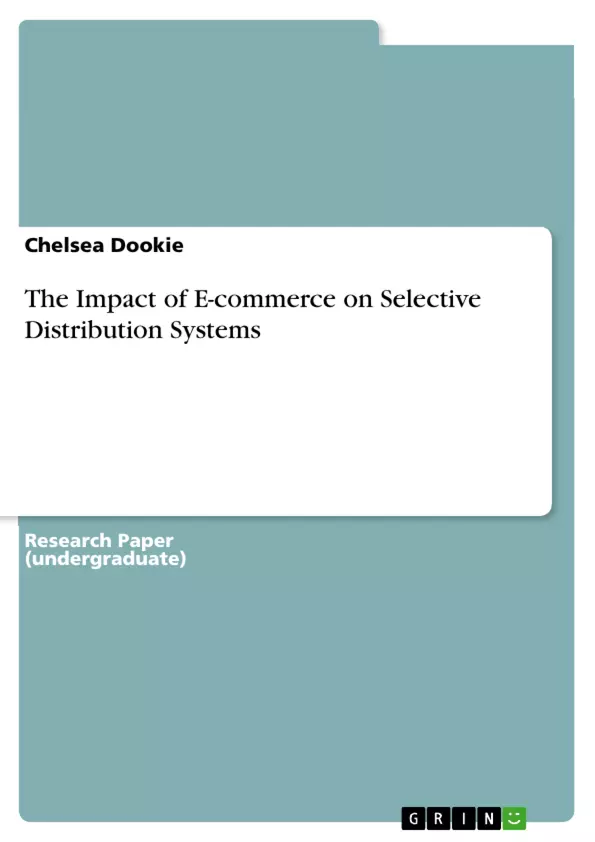Due to the rapid and consistent progression and development of information technology and computer science, widespread use of the internet has catapulted internet sales and e-commerce. E-commerce brings with it many pros and cons. In addition, it significantly affects agreements between the various players of competition law. This research paper seeks to analyse the impact of e-commerce on vertical agreements, particularly, selective distribution agreements. Vertical agreements are agreements which are entered into by undertakings or firms which operate at different levels of the market. Selective distribution systems are a type of vertical agreement within which a supplier sells goods or services to distributors who are obliged to sell these goods or services based on specific criteria. Throughout this paper, the repercussions of e-commerce which are experienced by manufacturers, distributors and consumers will be examined in order to determine the role and effect of e-commerce on selective distribution systems. There will also be critical examination of the rules governing vertical agreements in the European Union and an assessment of their appropriateness and applicability. The pertinency of the aforementioned rules will be discussed and recommendations will be made accordingly.
Both primary and secondary sources are to be utilized in the execution of this research paper. Through a critical examination of such materials, there will be thorough analysis of the primary focus of this paper, the impact of e-commerce on selective distribution systems.
Inhaltsverzeichnis (Table of Contents)
- Introduction
- Chapter 1: The Nature and Economics of the Selective Distribution System
- 1.1 Vertical Agreements
- 1.2 Selective Distribution Agreements
- 1.3 Pro-competitive and Anticompetitive Elements of Selective Distribution Systems
- 1.4 Conclusion
- Chapter 2: The Impact of E-commerce on the Participants in Selective Distribution Systems
- 2.1 Introduction
- 2.2 Selective Distribution and E-commerce
- 2.3 The Impact of E-commerce on Consumers in Selective Distribution Systems
- 2.4 The Impact of E-commerce on Distributors in Selective Distribution Systems
- 2.5 The Impact of E-commerce on Manufacturers in Selective Distribution Systems
- 2.6 Conclusion
- Chapter 3: The Legal Problems Posed by E-commerce in Selective Distribution Systems
- 3.1 Introduction
- 3.2 The European Commission's Guidelines and Regulation 330/2010
- 3.3 The Application of the Vertical Guidelines in the Case Law
- 3.4 Deficiencies of Regulation 330/2010
- 3.5 Conclusion
- Conclusion and Recommendations: The Impact of E-commerce on Selective Distribution Systems
Zielsetzung und Themenschwerpunkte (Objectives and Key Themes)
This paper examines the impact of e-commerce on selective distribution systems, analyzing its effects on manufacturers, distributors, and consumers. It specifically focuses on the legal issues arising from manufacturers' attempts to restrict or prohibit online sales by authorized distributors. The paper analyzes the compatibility of these restrictions with EU law, particularly in light of the European Commission's Regulation 330/2010 on vertical agreements. The key themes of this paper include:- The nature and economics of selective distribution systems
- The impact of e-commerce on various participants in selective distribution systems
- The legal challenges posed by e-commerce in selective distribution systems
- The application and interpretation of EU law, specifically Regulation 330/2010, in the context of selective distribution agreements
- Recommendations for addressing the challenges posed by e-commerce in selective distribution systems
Zusammenfassung der Kapitel (Chapter Summaries)
- Chapter 1: The Nature and Economics of the Selective Distribution System: This chapter defines vertical agreements, including selective distribution agreements, and analyzes their potential pro-competitive and anticompetitive elements. It examines the legal framework governing vertical agreements under EU competition law, highlighting the importance of the Treaty on the Functioning of the European Union (TFEU).
- Chapter 2: The Impact of E-commerce on the Participants in Selective Distribution Systems: This chapter explores the various impacts of e-commerce on manufacturers, distributors, and consumers within selective distribution systems. It examines how e-commerce can both benefit and disadvantage each stakeholder group.
- Chapter 3: The Legal Problems Posed by E-commerce in Selective Distribution Systems: This chapter analyzes the legal issues arising from the introduction of e-commerce into selective distribution systems, focusing on the compatibility of restrictions imposed on online sales by distributors with EU law. It delves into the European Commission's Guidelines and Regulation 330/2010, examining their application in case law and identifying any deficiencies in the legal framework.
Schlüsselwörter (Keywords)
The main keywords and focus topics of this paper include: selective distribution systems, e-commerce, vertical agreements, EU competition law, Regulation 330/2010, online sales, distributors, manufacturers, consumers, legal challenges, case law, and recommendations.- Quote paper
- Chelsea Dookie (Author), 2018, The Impact of E-commerce on Selective Distribution Systems, Munich, GRIN Verlag, https://www.hausarbeiten.de/document/1448915


